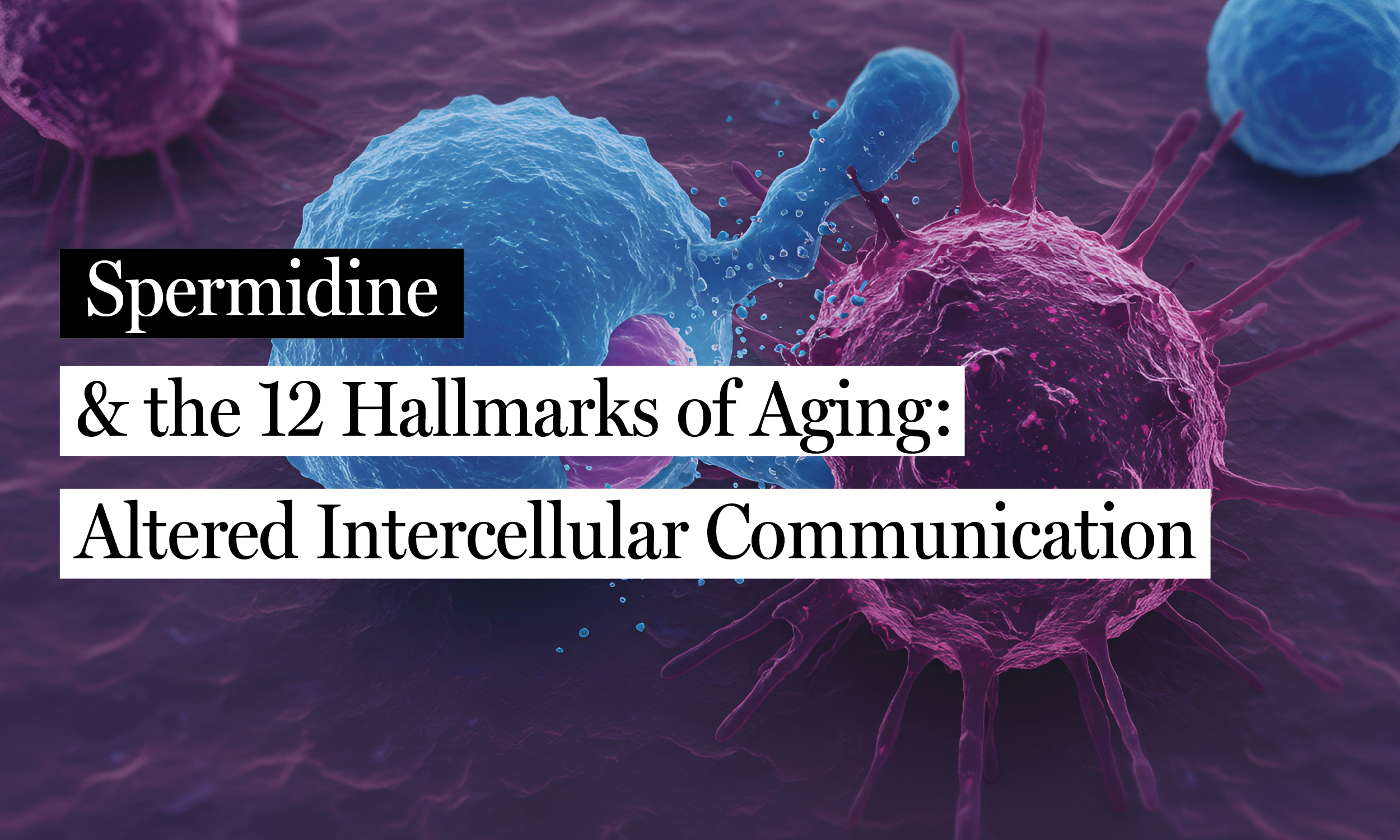
Aging is a complex process that affects every cell, tissue, and organ in the body. Scientists have identified several hallmarks of aging, and one of the most intriguing is altered intercellular communication. This hallmark refers to the loss of proper communication between cells, leading to chronic inflammation, disrupted nutrient sensing, and reduced immune surveillance. These changes contribute to age-related diseases and the overall decline in health. Excitingly, recent research has highlighted the potential of spermidine, a naturally occurring polyamine, to counteract these effects and restore balance to intercellular communication. Let’s explore how.
What Is Altered Intercellular Communication?
As we age, the signaling pathways that allow cells to communicate become disrupted. This disruption shows up in several key ways:
- Chronic inflammation (inflammaging): Normally, inflammation is a short-term defense mechanism, switching on when the body detects infection or injury and then resolving once the threat is gone. With age, damaged cells and cellular debris continue sending distress signals, keeping immune pathways switched on. This lingering, low-grade inflammation gradually harms healthy tissues and fuels age-related diseases such as arthritis, cardiovascular disease, and neurodegeneration.
- Disrupted nutrient sensing: Cells rely on precise signaling networks to detect energy and nutrient availability. Aging impairs these pathways, particularly those involving insulin and mTOR, leading to poor metabolic regulation, insulin resistance, and increased risk of obesity and type 2 diabetes.
- Reduced immune surveillance: The immune system’s ability to identify and clear damaged, infected, or precancerous cells declines with age. T cells, a type of white blood cell, play a central role in this process by recognizing and destroying infected or abnormal cells. With aging, T cells become less effective, allowing harmful cells to accumulate and increasing susceptibility to infections and cancers. These disruptions create a vicious cycle, accelerating the aging process and increasing vulnerability to disease.
How Spermidine Can Help
Spermidine is a powerful ally in the fight against aging. Beyond its well-known role in kickstarting autophagy, it also helps maintain proper cellular communication, supporting overall cellular balance and resilience.
1. Anti-Inflammatory Effects
Chronic inflammation contributes to altered intercellular communication. Spermidine has significant anti-inflammatory properties, reducing inflammatory signals and helping restore a healthier cellular environment that allows cells to communicate more effectively (Madeo et al., 2018; Li et al., 2020).
2. Improved Immune Function
A well-functioning immune system is essential for intercellular communication, particularly in identifying and eliminating harmful cells. Spermidine enhances the activity of immune cells, including supporting T cell development and differentiation, which are critical for a robust immune response (Alsaleh et al., 2020; Carriche et al., 2021).
3. Antiviral and Anticancer Properties
Spermidine strengthens immune surveillance, helping the body combat viral infections and cancer. It reduces viral propagation in human lung cells and enhances anticancer immunosurveillance by boosting T cell activity and other immune components (Gassen et al., 2021; Pietrocola et al., 2016, 2017). Recent evidence also shows that spermidine improves mitochondrial activity and the cytotoxic functions of CD8+ T cells (a specialized subset of T cells that directly kill infected or cancerous cells), strengthening overall antitumor immunity in both aged and young mice (Al-Habsi et al., 2022).
4. Restoring Balance in Aging Tissues and the Gut
The gut microbiome plays a crucial role in intercellular communication, influencing metabolism, immunity, and systemic health. Spermidine improves gut microbiota composition, enhancing metabolic and immune functions, improving insulin resistance, and reducing bacterial infections (Ma et al., 2020). Beyond the gut, spermidine helps correct local and systemic disruptions in aging tissues, reducing inflammation and improving tissue function in models of intestinal dysbiosis and abdominal aortic aneurysm (Liu et al., 2020; Liu et al., 2022).
Conclusion
Altered intercellular communication is a central hallmark of aging, contributing to chronic inflammation, disrupted nutrient sensing, and weakened immune surveillance. Spermidine offers a promising strategy to counteract these changes by reducing inflammation, enhancing immune function, supporting T cell activity, and improving gut microbiota and systemic health. While further research is needed to fully understand its mechanisms and optimize its use, current evidence suggests that incorporating spermidine through diet or supplementation under medical guidance may help restore cellular balance, support resilience, and promote healthier aging. By targeting one of the root causes of age-related decline, spermidine represents a powerful tool in the ongoing pursuit of longevity and well-being.

(Adapted from López-Otín et al., 2022)
Curious about the other hallmarks of aging and how spermidine can help combat them? Read more here.







